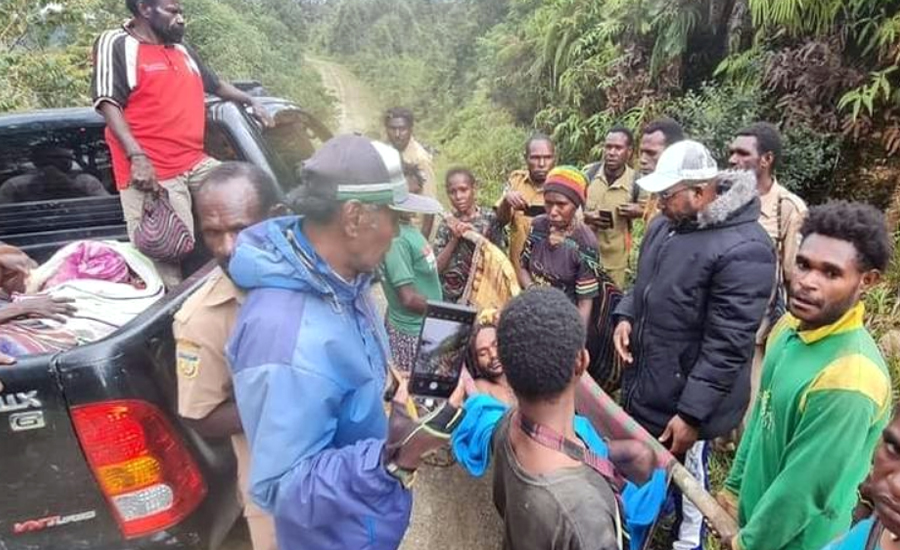Three brothers killed by Indonesian soldiers at Papuan health clinic: army and witness accounts differ

JAKARTA (Reuters) - One mid-February morning in the central highlands of the Indonesian province of Papua, the army said Prada Ginanjar Arianda, a 22-year-old member of the 400 Banteng Raiders commando battalion, was shot in the stomach by separatist fighters and died.
About 24 hours later, after a sweep by security forces through nearby hamlets that sent hundreds of residents fleeing to the safety of two churches, distraught family members were at a health clinic collecting the bodies of three brothers, Janius, Soni and Yustinus Bagau.
Ever since Papua was incorporated into Indonesia after a United Nations-supervised vote by only about 1,025 people in 1969, Indonesia has tried to quell a rebellion among its distinct Melanesian indigenous population of about 2.5 million who are seeking independence. Papua, rich in resources, has among the worst poverty rates in Indonesia despite $7.4 billion of funding by the central government over the past 20 years.
In a statement to media the day after the shootings, the military said the brothers were armed separatists who tried to seize their weapons and were killed by security forces in an act of self-defence. The military did not specify who it held responsible for Arianda’s death.
Reuters spoke to more than a dozen people, including a Catholic priest and a local government official, family members and human rights monitors by phone and also reviewed photos of the men’s bodies, a report on the killing of the brothers by human rights investigators in Papua and other evidence which all cast doubt on the official version of how the men died.
Indonesia is the world’s third-largest democracy, the biggest economy in fast-growing Southeast Asia and an increasingly important global diplomatic player in efforts to resolve conflicts in Myanmar and Afghanistan. But the United Nations and rights advocates say its security forces are carrying out grave abuses at home.
“We are continuing to receive credible reports of excessive use of force by the military and police, including extrajudicial killings, harassment, arbitrary arrests and detention of indigenous Papuans,” Ravina Shamdasani, a spokeswoman for the U.N. High Commissioner for Human Rights, told Reuters.
Since 2010, there have been 178 unlawful killings of civilians by security forces in the Papua region, according to data from Amnesty International. In the past three years alone, Amnesty said there had been at least 83 victims.
Indonesia’s coordinating minister for security Mahfud MD did not respond to detailed findings and questions sent to his office last Tuesday related to the men’s deaths and broader concerns of human rights abuses by security forces in Papua. He released a statement on Wednesday to the media saying that Papua was part of Indonesia and this “will be maintained at all costs necessary.”
An adviser to Indonesia’s president referred Reuters to Mahfud.
The military declined to comment directly on the findings and questions. A spokesman for its Papua command, Colonel Gusti Nyoman Suriastawa, sent a short statement to Reuters accusing separatists, some of them operating under cover as civilians, of terrorising the region.
The armed wing of the separatist Free Papua Organisation (OPM) has killed 11 civilians and wounded four more since January 2020, according to human rights groups and analysts.
A spokesman for the Papuan armed separatists, Sebby Sambom, said the armed uprising was legitimate as former colonial power the Netherlands promised independence to Papua before it was annexed by Indonesia in 1963 and the small vote in 1969 was not an expression of Papuan aspirations. Indonesia claims Papua as its territory, citing the U.N.’s role in the vote and the Netherlands’ recognition of its sovereignty. Sambom said civilians who were killed by the OPM were enemy spies and targeting them was “normal in a war situation.”
Verifying human rights abuses in Papua is difficult. Foreign media have been banned from visiting the area since a deadly crackdown by security forces on mass protests by indigenous people in late 2019.
A 2018 request by the U.N. human rights commissioner for access to the region has not been approved by the Indonesian government after the two sides failed to agree on terms.
‘SHOT IN THE ARM’
On Feb. 15, the day of the shooting, soldiers and police went looking for the perpetrators and searched for weapons among the homes and small farms in Mamba village. Residents told Reuters the soldiers regularly fired their weapons in the air and questioned at least a dozen men.
Janius Bagau, the eldest brother, in his early 30s, was one of those interrogated. The military said in its statement he made a run for it, ignored warnings to stop and was shot in the arm before jumping into a ravine and escaping.
An account compiled from at least five witnesses by the Justice and Peace Secretariat at the Timika Diocese of the Catholic Church said Janius fled because he was beaten and stabbed with a bayonet in his thigh while being interrogated. Reuters could not independently verify the group’s account.
After a perilous journey down a muddy road in the thick jungle, carried by villagers on a stretcher fashioned from a sarong and two wooden poles, Janius was placed in a black pick-up truck and taken to a nearby health clinic in the late afternoon, four witnesses told Reuters.
Spying a small bracelet on the wrist of Janius’ brother Yustinus depicting the Morning Star flag, a popular symbol of Papuan independence banned by the Indonesian government, the security forces detained Yustinus before the group could enter the clinic front gate, the witnesses said.







